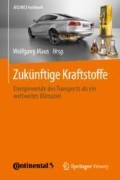Abstract
Since the early 20th century, transport by road, sea and air has mainly been fueled by liquid hydrocarbons derived from crude oil. As crude oil derivatives have enjoyed a large cost advantage compared to alternative more sustainable fuels, the symbiotic development of fuel distribution and engine technology has centered around fossil fuels.
Access this chapter
Tax calculation will be finalised at checkout
Purchases are for personal use only
Notes
- 1.
US Energy Information Administration.
- 2.
Eurostat.
- 3.
- 4.
- 5.
- 6.
- 7.
- 8.
- 9.
- 10.
- 11.
- 12.
US Energy Information Administration (EIA) “China’s use of methanol in liquid fuels has grown rapidly since 2000” https://www.eia.gov/todayinenergy/detail.php?id=30072 and Oxford Institute for Energy Studies “Gasoline Demand in Non-OECD Asia” https://www.oxfordenergy.org/wpcms/wp-content/uploads/2017/11/Gasoline-Demand-in-Non-OECD-Asia-Drivers-and-Constraints-WPM-74.pdf.
- 13.
- 14.
- 15.
- 16.
- 17.
References
IEA International Energy Agency (2017) Global EV Outlook 2017: Two million and counting. IEA Publ 1–71. https://doi.org/10.1787/9789264278882-en
Romare M, Dahllöf L (2017) The Life Cycle Energy Consumption and Greenhouse Gas Emissions from Lithium-Ion Batteries
Bloomberg Finance Energy (2017) Electric vehicle outlook 2017, pp 1–5
Figueres C, Schellnhuber HJ, Whiteman G et al (2017) Three years to safeguard our climate. Nature 546:593–595. https://doi.org/10.1038/546593a
Olah GA, Goeppert A, Prakash GKS (2009) Beyond oil and gas: the methanol economy, 2nd edn. Wiley-VCH, Weinheim
Harp G, Tran KC, Bergins C, et al (2015) Application of power to methanol technology to integrated steelworks for profitability, conversion efficiency, and CO2 reduction. In: METEC & 2nd ESTAD, Düsseldorf, Germany
Rubin ES, Davison JE, Herzog HJ (2015) The cost of CO2 capture and storage. Int J Greenh Gas Control 40:378–400. https://doi.org/10.1016/j.ijggc.2015.05.018
Buttler A, Spliethoff H (2018) Current status of water electrolysis for energy storage, grid balancing and sector coupling via power-to-gas and power-to-liquids: a review. Renew Sustain Energy Rev 82:2440–2454. https://doi.org/10.1016/j.rser.2017.09.003
Philibert C (2017) Renewable energy for industry
Wiser R, Bolinger M (2018) 2016 Wind technologies market report
Edwards R, Padella M, O’Connell A (2017) Discussion document
Siegemund S (2017) The potential of electricity-based fuels for low-emission transport in the EU
Nichols RJ (2003) The methanol story: a sustainable fuel for the future. J Sci Ind Res (India) 62:97–105
Pearson RJ, Turner JWG, Peck AJ (2009) Gasoline-ethanol-methanol tri-fuel vehicle development and its role in expediting sustainable organic fuels for transport. In: IMechE Conf Low Carbon Veh 2009, Inst Mech Eng London, 20–21 May 2009
Bromberg L, Cedrone K, Cohn DR (2013) Ultra-high efficiency methanol engines with advanced exhaust energy recovery efficient engines & efficient alternative liquid fuels
Çelik MB, Özdalyan B, Alkan F (2011) The use of pure methanol as fuel at high compression ratio in a single cylinder gasoline engine. Fuel 90:1591–1598. https://doi.org/10.1016/j.fuel.2010.10.035
Vancoillie J, Demuynck J, Sileghem L et al (2012) Comparison of the renewable transportation fuels, hydrogen and methanol formed from hydrogen, with gasoline – engine efficiency study. Int J Hydrogen Energy 37:9914–9924. https://doi.org/10.1016/j.ijhydene.2012.03.145
Vancoillie J, Demuynck J, Sileghem L et al (2013) The potential of methanol as a fuel for flex-fuel and dedicated spark-ignition engines. Appl Energy 102:140–149. https://doi.org/10.1016/j.apenergy.2012.05.065
IMO (2016) Methanol as marine fuel: environmenal benefits, technology readiness and economic feasibility
Maus W, Jacob E, Hirth P, Maus W, Brück R, Jacob E, Hirth P, Jäger W
Wasmus S, Küver A (1999) Methanol oxidation and direct methanol fuel cells: a selective review. J Electroanal Chem 461:14–31. https://doi.org/10.1016/s0022-0728(98)00197-1
Author information
Authors and Affiliations
Corresponding author
Editor information
Editors and Affiliations
Rights and permissions
Copyright information
© 2019 Springer-Verlag GmbH Deutschland, ein Teil von Springer Nature
About this chapter
Cite this chapter
Stefansson, B., Sigurbjörnsson, Ó. (2019). Sustainable Fuel from CO2 and Electricity: A Commercial Scale Solution Ready to Meet Future Challenges. In: Maus, W. (eds) Zukünftige Kraftstoffe. ATZ/MTZ-Fachbuch. Springer Vieweg, Berlin, Heidelberg. https://doi.org/10.1007/978-3-662-58006-6_20
Download citation
DOI: https://doi.org/10.1007/978-3-662-58006-6_20
Published:
Publisher Name: Springer Vieweg, Berlin, Heidelberg
Print ISBN: 978-3-662-58005-9
Online ISBN: 978-3-662-58006-6
eBook Packages: Computer Science and Engineering (German Language)

